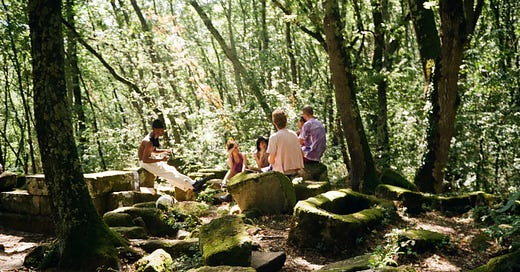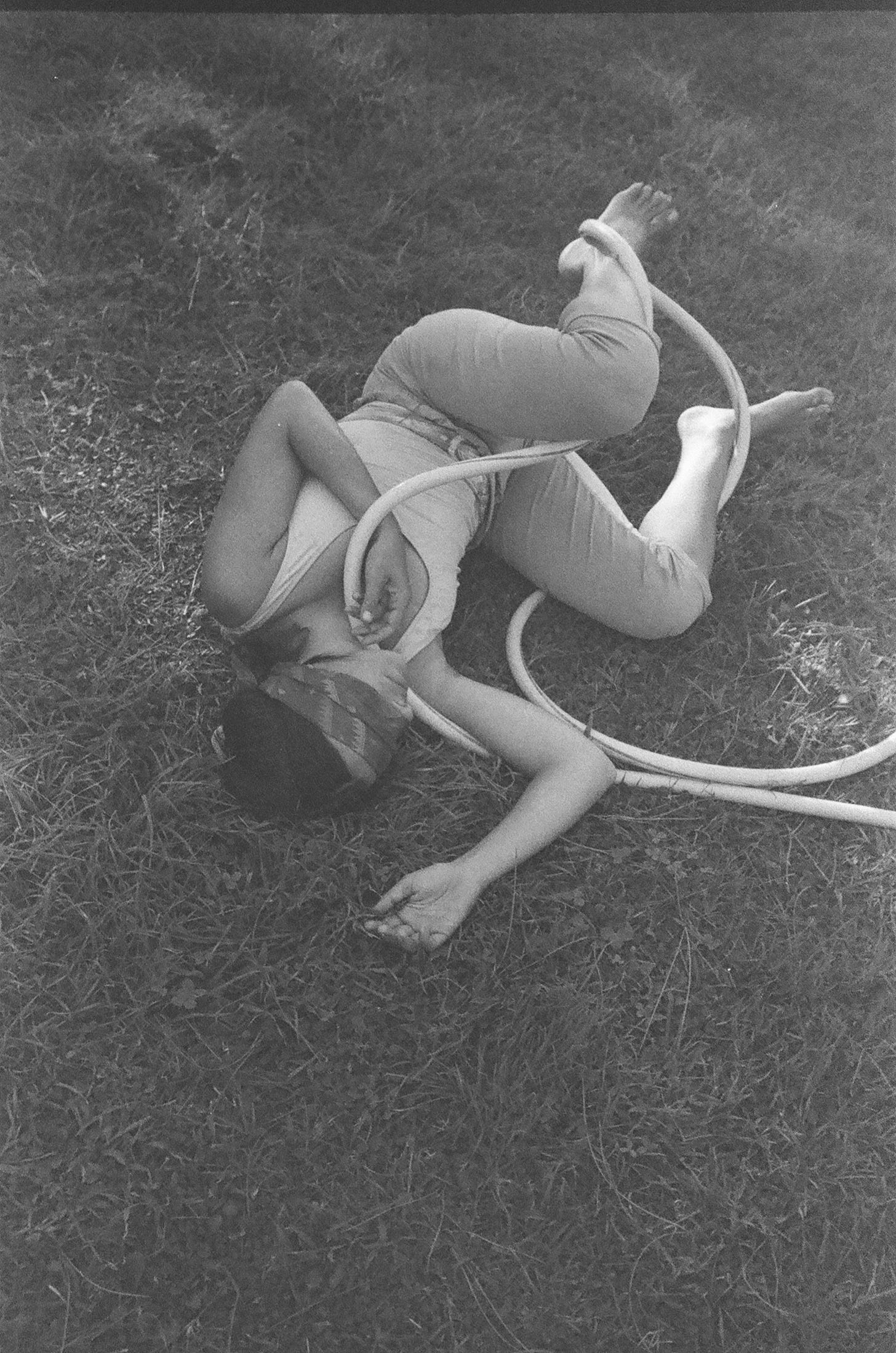The Politics of Enchantment
A conversation about magic, mythic creatures and ancestry with Francesca Heart.
Before you start reading this piece, please put this album on:
My grandfather was a creature of the sea. As an amateur diver, he collected shells from the Red Sea, the Mediterranean, the Atlantic and the Pacific Oceans, a practice that would be illegal today, but it left us with some magic. Most are in our family house on an island, where the sea surrounds us. Every day I pick one of the shells; it is twice the size of my hand and has little fossils on its skin that tell a story of a time my memory cannot reach. When my grandfather died, my mother told me he would always tell her to place this shell on her ear and ask her, “Can you hear the sea?”
“Wow, you are between a seashell and a fire,” observes Francesca Heart when we sit down for our talk. I just lit the fireplace in my living room, a practice that feels rare these days. I pick up the shell and place it on my right ear, “Can you hear the sea?” she asks. Immediately I know she is also a water creature.
Francesca is a dancer, musician, and expert in embodiment practice, which is a method of using the sensations of our body as a tool to develop awareness, presence, and connection. Her aesthetic is childlike and magical, and very 90s, her expression and explorations generate new ways to empowerment from within the field of musical playfulness and creative intuition. Her work is deeply rooted in practices of collective and individual healing with a political foundation.
“The base of it is always your lived experience and your emotional landscape. Your trauma, your hopes, your fears, your memory. Why go to a dance space and forget about that?”
She tells me that arriving here has been an organic process; from her youth as a contemporary dancer to studying international politics in the UK to studying embodiment as a feminist practice and reclaiming enchantment. “At first I didn’t realize that what I was trying to write on the political sphere, whether it was about the patriarchy or unpacking systems of oppression we live in, was also a way to heal myself,” she tells me. Francesca’s work is focused on rebuilding narratives around the body, occupying landscape, and emotional work through movement and voice. She embraces multitudes gracefully, mixing her spiritual work and political practice.
Connecting to her youth, dance became a language, a way of coming to terms with trauma, a vector to move things. “Dance is not something that is detached from my personal sphere,” she tells me. “The base of it is always your lived experience and your emotional landscape. Your trauma, your hopes, your fears, your memory. Why go to a dance space and forget about that?” I relate to this deeply. As a woman, I have been conditioned to detach from my body in an emotional way and to be purely aesthetic about it.
Our body speaks of abuse, of social and political oppression, of war. Embodiment work is an incredible antidote to the systemic issues buried deep in our bodies.
Doing this political work in a landscape that is artistic and spiritual requires a lot of grounding and perhaps a little magic. “There has been this sort of growth of healing and new age practices, that distances itself from the political sphere,” because it seeks to relax and quiet the mind, and this is very hard to do when we are angry about systemic issues, she says. “It is very hard on the other hand to navigate these political spaces where everything is very critical, almost detached from the soul. Where is the enchantment in this?” she asks. This is where our conversation takes a direction towards the politics of Enchantment.
The Oxford dictionary defines enchantment as “the state of being under a spell; magic. or a feeling of great pleasure; delight.” Activists like adrienne maree brown have been tirelessly promoting pleasure as a freedom practice, and more and more people are embodying pleasure activism as an important practice for change.
More than pleasure, Francesca is focused on the feeling of magic, and to “revivify the adventure spirit of childhood”, she says. This is visible from the way she dresses to her Goodnight music compilations, she oozes magic. There is a childlike enthusiasm in the way she navigates complex subjects.
Music is the practice where she has truly dived into enchantment. “When I make music, I really fantasize about what could possibly emerge. Who is the ocean speaking to? What is this little chapel with these cute angel statues?” she gestures to the air. Her music compositions feel like what would happen if the sea creatures and forest creatures began to dance together in mythical landscapes.
Another magical application of her work is the Water Info Transmission workshop which uses cell phones as if they were shells, “Shell phones!” she says, I smile. I ask her about the sea, and inevitably we begin exploring what water means to both of us. To me, it means home, comfort, and also what I am missing the most. To her, it is a huge part of her roots and her work. The first time I came to her work I was fascinated by her project Hydrofemme, which draws from hydro feminism.
Hydrofeminism is the idea that liquids are always exchanged between humans and the environment. From sweat to eating, urinating, orgasm. Everything is connected. “That’s the idea that I like to transpose from hydrofeminism to embodiment; that the body is like a liquid solidification of a variation process that comes from the water and develops on land in an evolutionary process.” She draws into sedimentation as a metaphor for the things inside us that are dormant, which we can awaken through movement. I turn to fix the fireplace.
Spiritual practices in the West today borrow so much from other cultures that the line between learning and appropriating has been thinning. “There are some practices I learned in Brazil that have profoundly influenced me, but I would never teach them,” she says. "The question I pose is: How can white women connect to their own ancestry and spiritual past in addition to learning from other cultures? How can we search for the magic of what our ancestors created? I’ve talked extensively about this and the research is ongoing.
“What is that beautiful shell?” she indicates to a shelf on top of my head, and I take out the collection of shells from my grandfather. We begin speaking of our Italian nonnas, grandmothers, as the archetypes of care.
Her project about grandmothers in Calabria is a stunning piece of work which made me think of how I might explore my Italian ancestry and roots. Her parents moved from Calabria to Milan in the North of Italy, where she was born, but she has always felt very southern Italian and looks it. Dark hair, thick dark eyebrows and porcelain skin. “My grandmother is gone now. My connection with her in the spirit world has made me stronger, she keeps supporting me. You should see her, I will send you a picture, she really embodied a strong big lady, like one that keeps all the threads together”.
A weaver, I say. Like us today.
Francesca was also a teacher in a course I curated on advaya about the Wisdoms of Water, featuring incredible people like Bayo Akomolafe, Veda Austin, and the amazing Astrida Neimanis who created the concept of hydrofeminism. You can access it here and as a WAVES reader you get a 20% discount with the code WAVES-WOW.
Francesca and I have curated, especially for this piece, some resources and two short exercises to access enchantment. Find them below!
Keep reading with a 7-day free trial
Subscribe to Waves to keep reading this post and get 7 days of free access to the full post archives.







